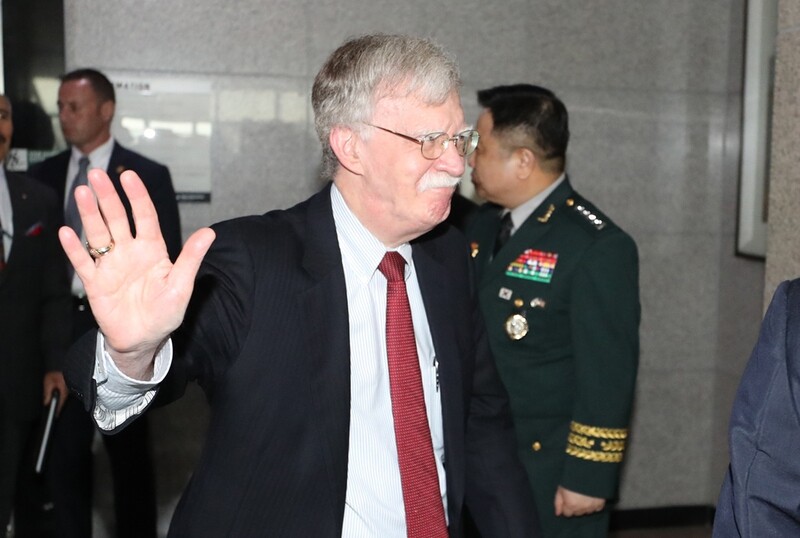hankyoreh
Links to other country sites 다른 나라 사이트 링크
[Editorial] S. Korea has little to lose by withdrawing from GSOMIA

US White House National Security Advisor John Bolton, currently on a visit to South Korea, brought up the issue of deploying South Korean military units to the Strait of Hormuz during a meeting with Blue House National Security Director Chung Eui-yong. The Blue House reported on July 24 that Chung and Bolton had agreed to continue deliberations about ways to cooperate on maritime security and the freedom of navigation in the Strait of Hormuz. That can be basically understood as constituting a request for South Korea to send military assets to the region. The government needs to make a prudent decision on this issue, viewing it from all angles, while placing top priority on South Korea’s national interests.
On July 19, the US organized an information meeting for diplomats from various countries, at which it urged them to join a coalition for protecting civilian vessels in the Strait of Hormuz. That also appears to have been the focus of Bolton’s visit to Japan, prior to his arrival in South Korea. There are indications that the South Korean government is leaning toward contributing to a coalition force in the strait.
True, the Strait of Hormuz is a critical area for South Korea, since 70% of crude oil bound for the country must pass through it. But the primary origin of the tensions is the nuclear dispute between the US and Iran. Rushing to side with the US could sour our relations with Iran. Furthermore, South Korea already has plenty of diplomatic challenges on its plate —not only the North Korea-US denuclearization negotiations, but also, and more urgently, South Korea’s current trade spat with Japan. South Korea can take its time making its decision while strengthening cooperation with the US on such issues.
It’s especially crucial that we ask the US to play a proactive role in mediating the dispute between South Korea and Japan, which was triggered by Japan’s economic retaliatory measures. While that issue did come up during Chung and Bolton’s meeting, there’s no telling how detailed the discussion was. The South Korean government has already announced that, if Japan takes additional punitive measures, it will consider all options, including withdrawing from the General Security of Military Information Agreement (GSOMIA), an intelligence-sharing agreement between the two countries. While the US is concerned that scrapping GSOMIA could undermine its trilateral security cooperation with South Korea and Japan, South Korea has little to lose from dropping out of the largely ineffective agreement.
The US continues to maintain a neutral stance on the South Korea-Japan conflict. But if the conflict continues and starts impacting military issues, the US will inevitably lose out. The South Korean government needs to keep hammering on such points to bring the US around to its side. Cool-headed calculations are needed to link such issues to the question of joining a military coalition at the Strait of Hormuz.
Please direct comments or questions to [english@hani.co.kr]

Editorial・opinion
![[Column] Has Korea, too, crossed the Rubicon on China? [Column] Has Korea, too, crossed the Rubicon on China?](https://flexible.img.hani.co.kr/flexible/normal/500/300/imgdb/original/2024/0419/9317135153409185.jpg) [Column] Has Korea, too, crossed the Rubicon on China?
[Column] Has Korea, too, crossed the Rubicon on China?![[Correspondent’s column] In Japan’s alliance with US, echoes of its past alliances with UK [Correspondent’s column] In Japan’s alliance with US, echoes of its past alliances with UK](https://flexible.img.hani.co.kr/flexible/normal/500/300/imgdb/original/2024/0419/2317135166563519.jpg) [Correspondent’s column] In Japan’s alliance with US, echoes of its past alliances with UK
[Correspondent’s column] In Japan’s alliance with US, echoes of its past alliances with UK- [Editorial] Does Yoon think the Korean public is wrong?
- [Editorial] As it bolsters its alliance with US, Japan must be accountable for past
- [Guest essay] Amending the Constitution is Yoon’s key to leaving office in public’s good graces
- [Editorial] 10 years on, lessons of Sewol tragedy must never be forgotten
- [Column] A death blow to Korea’s prosecutor politics
- [Correspondent’s column] The US and the end of Japanese pacifism
- [Guest essay] How Korea turned its trainee doctors into monsters
- [Guest essay] As someone who helped forge Seoul-Moscow ties, their status today troubles me
Most viewed articles
- 1[Column] The clock is ticking for Korea’s first lady
- 2Samsung barricades office as unionized workers strike for better conditions
- 3[Editorial] When the choice is kids or career, Korea will never overcome birth rate woes
- 4[News analysis] After elections, prosecutorial reform will likely make legislative agenda
- 5S. Korea, Japan reaffirm commitment to strengthening trilateral ties with US
- 6All eyes on Xiaomi after it pulls off EV that Apple couldn’t
- 7After 2 months of delayed, denied medical care, Koreans worry worst may be yet to come
- 8US overtakes China as Korea’s top export market, prompting trade sanction jitters
- 9[Column] Has Korea, too, crossed the Rubicon on China?
- 10Hong Se-hwa, voice for tolerance whose memoir of exile touched a chord, dies at 76